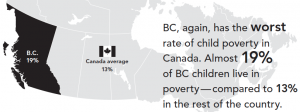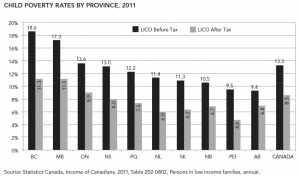Matthew Pearson, Ottawa Citizen, November 26, 2013– More than two decades after MPs pledged to eradicate child poverty by the year 2000, Canada continues to fail its poorest citizens.
One in seven children — or 967,000 — lived in poverty in 2011, down slightly from 979,000 in 2010, while four in 10 aboriginal children live in poverty, according to a 2013 report card prepared by Campaign 2000.
The umbrella organization, which represents a coalition of 120 national groups committed to eradicating child poverty in Canada, based its report on the most recent data available from Statistics Canada.
More children and their families lived in poverty as of 2011 than they did in 1989, when the House of Commons unanimously resolved to end child poverty in Canada by the year 2000.
Our child poverty rate, based on 2009 data, puts Canada at 24th place out of 35 Organization for Economic Co-operation and Development (OECD) countries.
The dismal results have renewed calls for drastic changes to Canada’s system of child benefits and movement on a long-awaited federal action plan to reduce poverty.
Many provinces and territories have created or are developing such strategies, but the federal government continues to drag its feet, said Project 2000’s Anita Khanna.
“We don’t see the same leadership or dedication from the federal government,” she said. “There’s been a lack of political will to tackle this issue.”
The Campaign 2000 report recommends the federal government implement a child benefit of $5,400, indexed to inflation, as a starting point to addressing the problem.
Eligible families can currently receive up to $3,654 annually through the combined Canada Child Tax Benefit (CCTB) and National Child Benefit Supplement (NCBS).
The funds are paid monthly and are non-taxable, non-refundable and based on the previous year’s family net income, meaning those with lower incomes receive a larger benefit than those with higher incomes.
Eligible families with net incomes of up to $25,356 received the maximum CCTB/NCBS this year, while families in the net income range of $25,356 to $43,561 may receive the full CCTB and part of the NCB.
Advocates want the government to eliminate the Universal Child Care Benefit, a monthly taxable payment of $100 to all families who have children under age six, and redirect the funds to the NCBS. It also wants the cash directed to the Child Tax Credit and the Child Fitness Tax Credit to be included in the new, larger National Child Benefit Supplement.
After these adjustments, the additional cost of raising the maximum CCTB/NCBS to $5,400 would be $174 million, the report says.
Campaign 2000 is unequivocal in its position that the Universal Child Care Benefit — which the Conservative government created in 2006 to give families more choice in choosing the child care option best suited to them — has not been an effective use of taxpayers’ money.
Public spending for the benefit from 2006 to this year is approximately $17.5 billion, the report says, yet it claims the federal government has collected no data to show how that money has been spent.
“A recent analysis concluded that — based on the available data — the claim that the UCCB has accomplished or improved ‘choice in child care’ is questionable at best. If it were used for regulated child care, the annual $2.5 billion expenditure could have modestly funded 700,000 additional child care spaces in each year,” the report says.
Read More: Ottawa Citizen

 Follow
Follow

